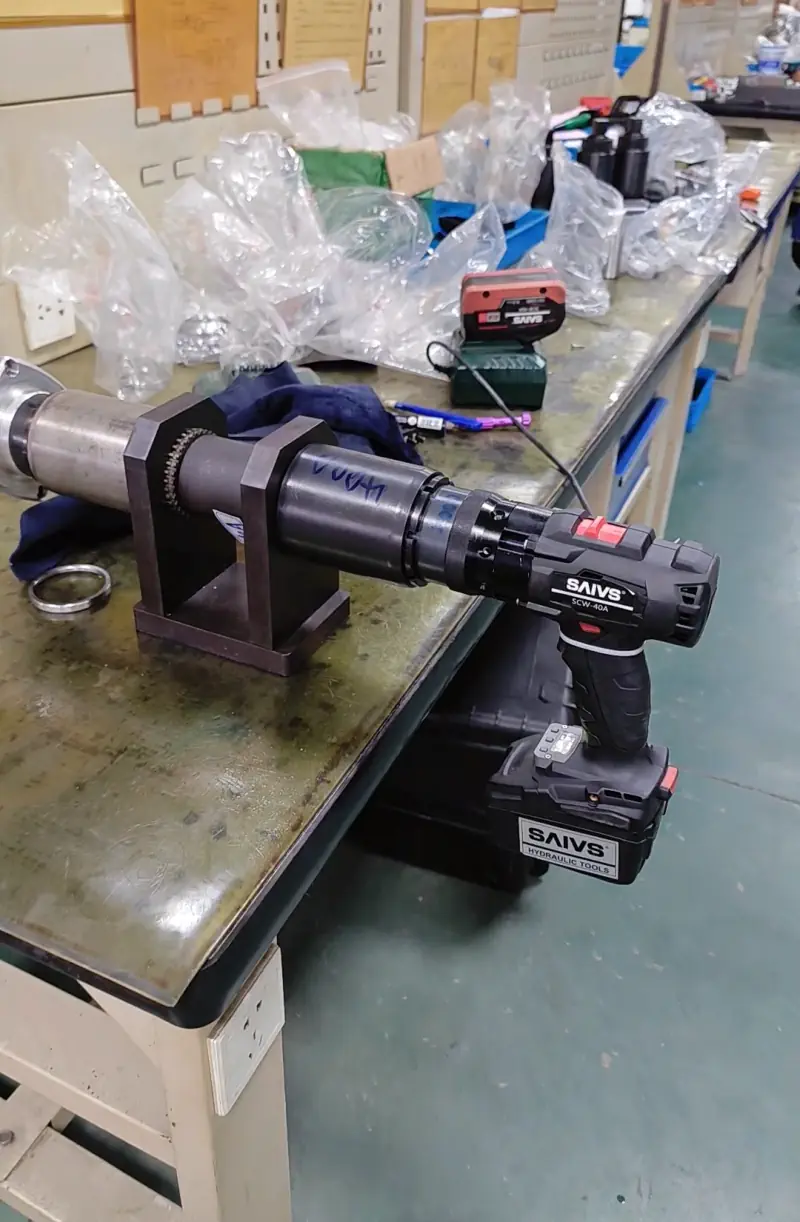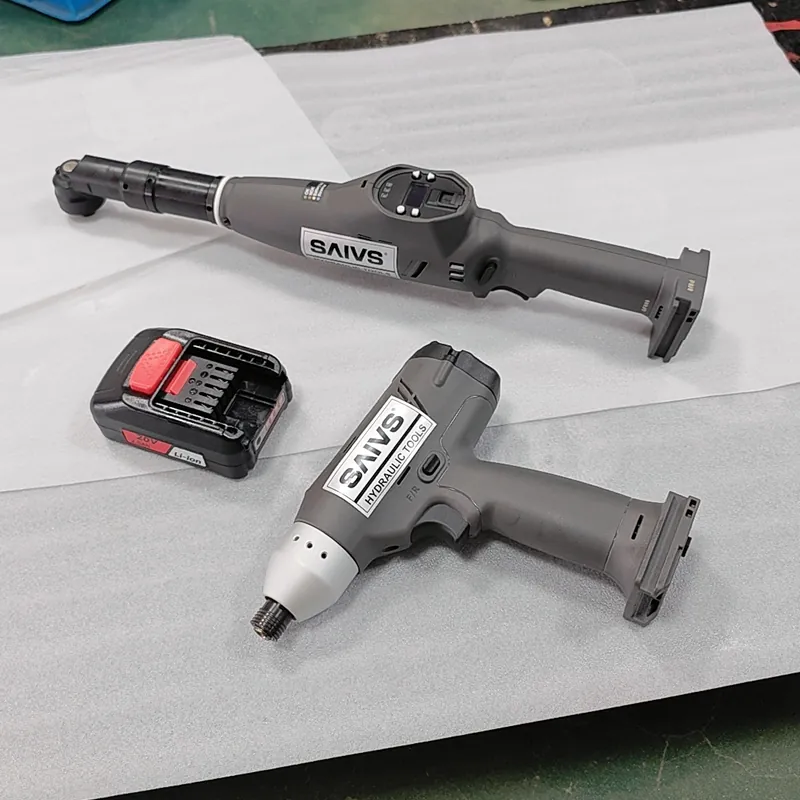Ultimate Guide to Battery Torque Wrench Operations: Boost Efficiency and Safety
Battery torque wrenches have become indispensable tools in modern industry, valued for their unmatched portability and ease of use. From aerospace and mining to power generation and manufacturing, these tools play a crucial role. However, even with enhanced usability, proper operation and strict safety protocols are paramount to ensure both work quality and personal safety. At Ningbo SAIVS machinery Co., Ltd, we understand this well. We specialize in providing top-of-the-line industrial-grade torque and tension equipment and are dedicated to guiding professionals on the correct use and maintenance of these essential tools.
This article will provide you with an in-depth look at the best practices for battery Torque Wrench operations. We'll cover everything from why correct usage is critical, to detailed safety precautions, proper usage steps, essential maintenance, and common mistakes to avoid. By following these guidelines, you'll not only maximize your tool's performance but also establish a safer and more efficient standard for your work environment.

Why Proper Battery Torque Wrench Use Is Essential
Using a battery torque wrench correctly is more than just operating a tool; it's vital for the success and safety of your work. Here’s why:
Ensure Accurate Torque for Structural Integrity
Correct usage is the only way to achieve the specified torque value. This is critical for ensuring that fasteners are tightened to their design requirements, which is essential for maintaining the structural integrity of assembled components in industries where precision is non-negotiable.
Prevent Over-Tightening and Component Failure
Over-tightening fasteners is a common but dangerous error. It can lead to deformation, damage, or even failure of bolts, nuts, or the joined components. In industrial settings, such failures can have catastrophic consequences. Proper operation effectively prevents this risk, protecting both your equipment and your team.
Avoid Accidents and Protect Operators
Improper use can cause the torque wrench to slip unexpectedly or the reaction arm to move suddenly, leading to serious injury. Mastering the correct grip and operating techniques is fundamental to ensuring your own safety.
Extend Tool Life and Reduce Costs
Following best practices not only guarantees the quality of each job but also significantly extends the tool's service life. This reduces the need for frequent repairs and replacements, lowering your long-term operational costs.
Pre-Operation Safety Checks and Preparation
Before each use of your battery torque wrench, always perform these safety checks:
Wear Appropriate Personal Protective Equipment (PPE)
Always wear safety glasses, gloves, and any other necessary PPE to protect against potential injuries.
Inspect the Tool Thoroughly
Check the wrench for any signs of damage, wear, or malfunction. Pay close attention to the battery, Power Source, and reaction arm to ensure they are in proper working order.
Use the Correct Socket
Ensure the socket size matches the fastener you are working on. An ill-fitting socket can slip, damage the bolt or nut, and lead to accidents.
Maintain a Firm Grip
Keep a secure grip on both the wrench handle and the reaction arm to maintain full control and prevent a loss of control from the reaction force.
Be Aware of Your Surroundings
Ensure the work area is clear of obstacles and that other workers are at a safe distance to prevent injuries from the reaction arm or flying debris.

Steps for Proper Battery Torque Wrench Use
To achieve the best results and ensure safety, follow these steps:
Step 1: Select the Appropriate torque range
Choose a torque wrench with a range that covers the required torque value for your application. We recommend using the wrench within 20% to 100% of its full scale for optimal accuracy.
Step 2: Set the Desired Torque
Adjust the torque setting on the wrench to the specified value for the fastener. Consult the manufacturer's guidelines or engineering specifications for the correct torque.
Step 3: Position the Reaction Arm Correctly
Place the reaction arm against a sturdy, stationary object that can withstand the torque reaction force. Ensure the reaction arm is perpendicular to the wrench handle for maximum stability and safety.
Step 4: Apply Steady Pressure
Engage the fastener with the socket and apply steady, continuous pressure to the wrench handle until the desired torque is reached. The wrench will typically indicate this with an audible click, a visual indicator, or by automatically stopping.
Step 5: Avoid Impact or Pulsing
Battery torque wrenches are designed for smooth, continuous operation. Avoid using them in an impact or pulsing manner, as this can cause the wrench to lose calibration and affect the accuracy of the torque application.
Maintenance Guidelines to Prolong Tool Life
Proper maintenance is essential for ensuring the accuracy, reliability, and longevity of your tool:
Cleaning and Lubrication
Regularly clean the wrench to remove any dirt, grease, or debris. Lubricate moving parts, such as the ratchet head and the reaction arm pivot, with the manufacturer-recommended lubricant.
Store in a Protective Case
When not in use, store the torque wrench in its protective case to prevent damage from impacts, moisture, or dust. Avoid dropping the wrench on hard surfaces, as this can severely affect its calibration.
Calibrate Regularly
Have your torque wrench calibrated by a certified professional at least once a year, or more frequently if it is subjected to heavy use or if accuracy is in question. **Ningbo SAIVS machinery Co., Ltd** offers professional calibration services to ensure your tools maintain their precision.
Replace Worn or Damaged Parts
If you notice any worn or damaged components, such as the battery, socket, or reaction arm, replace them promptly to maintain the wrench's performance and safety.
Common Mistakes to Avoid
To prevent accidents and ensure the best results, avoid these common errors:
Using the Wrong Torque Range
Never use a torque wrench outside of its specified range. This will lead to inaccurate torque application and damage the tool.
Applying Torque to a Moving Fastener
Always ensure the fastener is stationary before applying torque to prevent the wrench from slipping and causing injury or damage.
Using the Wrench as a Breaker Bar
Torque wrenches are designed for tightening fasteners to a specific torque value, not for loosening tight or rusted bolts. Use a breaker bar for such tasks.
Submerging the Wrench in Liquid
Keep the torque wrench away from liquids. Moisture can damage internal components and affect the tool's accuracy and functionality.
By following these comprehensive best practices, you can fully leverage the power of your battery torque wrench while ensuring every job is completed safely, accurately, and efficiently. At Ningbo SAIVS machinery Co., Ltd, we not only provide industry-leading equipment but also offer the professional knowledge to help you tackle every task with confidence. Contact us to learn more about our products, services, and calibration solutions, and let us help you elevate your work standards.
Why Choose SAIVS™ as Your Supplier?
With 20 years of industry experience, SAIVS is a leading Chinese manufacturer of high-quality tools, offering competitive pricing and excellent customer service.We pride ourselves on exceptional quality control, extensive experience, and comprehensive after-sales service.